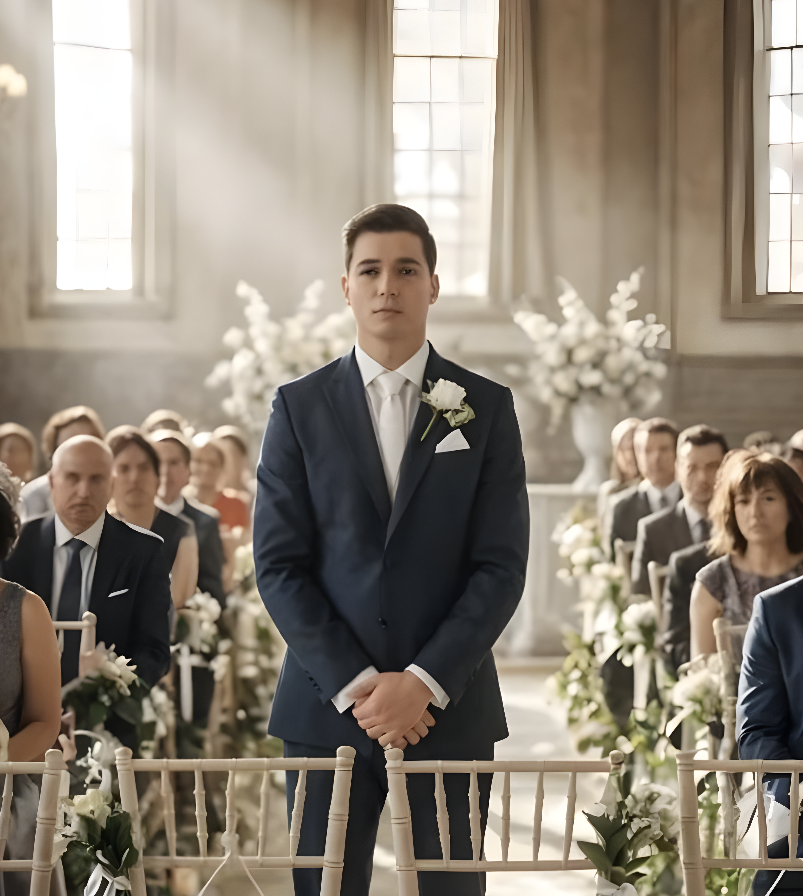Elias had pictured that day so many times—his wedding, a simple hall strung with soft lights, a handful of guests clinking glasses, and, most importantly, his family filling the first row. He’d saved those five chairs himself: his mother, father, sister, and Matt, his best friend who’d promised to stand by him as best man.
But when the music swelled and the vows were spoken, those chairs stayed stubbornly empty. Each time Elias’ eyes drifted toward them, he felt the space widening, as though it were not just chairs that were missing, but an entire chapter of his life.
The reason came slowly, pieced together from murmurs and glances. His sister Alina had scheduled her engagement party for the same night. Everyone, including his parents, had chosen her.
It had not always been this way. As children, Elias and Alina were inseparable—partners in elaborate backyard games, co-conspirators against bedtime. But as they grew, the closeness frayed. Alina seemed to gather attention like sunlight, and Elias, despite trying, was often left in her shadow. He thought adulthood would mend this imbalance. Instead, it carved the divide deeper.
Eight months earlier, he had announced his wedding date, the culmination of years of careful planning with his bride, Lila. The date had been circled, the invitations mailed. His parents had nodded, promised to be there. And then, weeks before, came Alina’s announcement—an engagement party that would coincide exactly with his wedding day.
When Elias asked his mother if it was a mistake, her voice had been lined with tired patience.
“Alina’s in-laws are flying in from Europe. We can’t change that, Eli. It’s important to her future.”
Important. The word clung to him like burrs. His own day, his own love, was never framed as important—only negotiable.
On the night itself, the wound deepened. As the reception unfolded, laughter and clinking forks filled the hall, but Elias’ pocket buzzed insistently. His mother’s name flashed, again and again, until the count rose to fifty-two missed calls. Then came a text, simple and sharp: We need to talk. Now.
Trying to push it aside, Elias cut the wedding cake with Lila, forcing a smile. But the buzzing phone was relentless. Finally, he slipped outside into the cool night.
That was when his cousin Amelia called. Her voice was urgent, almost whispering, as though she feared being overheard.
“Elias, they’re talking about you. They’re telling everyone you set your wedding on this day to compete with Alina. Your mom… she’s panicking. She says you need to fix things for Alina—tonight.”
The absurdity of it made him laugh, bitter and hollow. Fix things? While they had abandoned his wedding, while they spun stories of his supposed jealousy?
Then Amelia sent the photo.
It showed Alina, radiant in her engagement gown, a familiar necklace gleaming at her throat—their grandmother’s wedding heirloom. The same necklace that had been promised to Elias, for his bride. He remembered asking for it months before, remembered his mother’s shrug as she claimed it had been damaged, “beyond repair.”
Now it shimmered in the photograph, perfectly whole, perfectly suited around Alina’s neck.
Moments later, a voice message arrived from his mother, her tone both casual and commanding.
“Elias… oh, by the way, I gave Alina Grandma’s necklace. She wanted something meaningful to wear. Don’t make a big deal out of it. It’s just a piece of jewelry.”
Just a piece of jewelry.
The words cracked something inside him. It wasn’t about the gold or the design. It was about the promise broken, the deliberate choice to erase him from his own narrative, to hand over what was meant for him as though he were undeserving.
Inside, the reception carried on, friends dancing, glasses raised. But Elias stood outside, staring at the glowing screen, feeling his chest tighten not with sorrow but with clarity.
He realized this wasn’t a single night’s betrayal. It was years in the making—years of quiet favoritism, of being told to step aside, of watching Alina crowned again and again while he was asked to understand, to forgive, to let it slide.
Lila stepped out, her hand warm on his shoulder. She didn’t ask what was wrong; she saw it in his eyes. For the first time, Elias didn’t try to soften it, didn’t make excuses for them.
“They didn’t come,” he said simply. “Not one of them. And now they’re asking me to clean up their mess.”
Lila’s gaze was steady, unflinching. “Then maybe it’s time to stop cleaning.”
The words sank into him like an anchor finding ground.
When he returned inside, the celebration went on. He danced with his bride, laughed with his friends, and felt the empty chairs at his back—not as shame, but as truth. They had chosen. And so, at last, would he.
That night, Elias typed a message to his mother. His hands trembled, not with fear but release.
I won’t fix Alina’s problems. I won’t excuse your absence. This was my wedding, and you weren’t there. I’m done being the afterthought.
He pressed send.
The phone buzzed again within seconds, her name lighting the screen. But this time, Elias slipped the device into his pocket and turned toward the dance floor, where Lila was waiting. The music rose, and he let himself move with it, step by step, into a life where he no longer begged for space in his own family’s story.
The five empty chairs remained. But Elias understood, at last, that emptiness could also mean room—room to build, to breathe, to choose who truly deserved to sit beside him.
And in that realization, something shifted. The silence of those chairs no longer haunted him. Instead, it promised him freedom.
